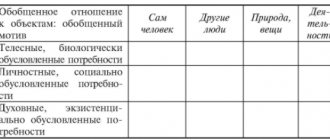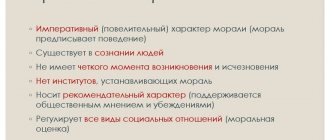Values are the ideas that guide us in life.. In this they are similar to plans, fears, intentions, attitudes, etc. All these are ideas that guide us in actions.
Among these ideas can only be our values, and not the consequences (as with plans, goals and fears), and the fact of their implementation (as with intentions and attitudes).
There is no single classification of universal human values by type . Let's give an example of grouping core values into types based on similar characteristics. There are values about...
- how we strive to treat people (honestly, openly, generously, mercifully);
- how we strive to act in general (bravely, thoughtfully, carefully);
- how we strive to approach things (with reverence, with honesty);
- how we strive to preserve something (simple, sensual, amazing, with complete surprise).
Definition of the concept and signs
What it is?
Life values are the views and beliefs that a person adheres to when committing his actions.
Based on his own life values, a person makes a decision about what is acceptable to him and what is not.
Despite the fact that people themselves determine life guidelines for themselves , in the process of constant existence in society they gradually begin to automatically obey their own guidelines and act in accordance with them.
This is explained by the fact that the existing norms and rules that a person adheres to are inherent in himself.
If he betrays his own views and beliefs, this will invariably lead to personality conflict, depression and low self-esteem.
List of main features:
- Significance . Attitudes are of great importance to a person; he values them and tries to comply with them.
- Mindfulness . A person consciously adheres to the principles and norms of behavior once chosen. The conformity of his actions with existing internal attitudes is the result of self-control and self-discipline.
- Activity and self-sufficiency. A person's beliefs are always present in him. To comply with his principles, a person does not need to listen to the opinions and advice of other people.
- Positivity . Values, unlike responsibilities, always carry a positive attitude. A person may be burdened by certain responsibilities, for example, the need to support children. At the same time, it is impossible to be burdened by such a value as respect for the interests of the child.
A life position that affirms the value of a person as an individual is called humanism .
We need to look for formulations that will be accepted by everyone
Archpriest Alexander Ilyashenko, rector of the Church of the All-Merciful Savior of the former Sorrow Monastery (Moscow)
Archpriest Alexander Ilyashenko
It seems to me that the idea of the document is good and correct, but it still needs to be finalized. For example, in the Strategy there are cliches dating back to Soviet times. Thus, it is said about the education of an individual capable of realizing his potential in the conditions of modern society. But modern society is not a constant quantity, it is changeable and how long it will exist in this form is unknown: the conditions of our life are changing quite quickly.
It turns out that we orient the personality to a short historical period, to something quickly changing, transient? Or do we still give her traditional values that are truly significant in the past, present and future? A contradiction emerges.
The document lists traditional values, and the words seem to be named correctly, but some can be understood in the broadest sense and sometimes, unfortunately, not at all in the way the creators of the document understood them. Any point of view can be adjusted to them, even one that contradicts the intention of the authors.
For example, what does “moral duty to oneself, one’s family and one’s Fatherland” mean? For example, General Vlasov believed that he was fulfilling his moral duty to himself and to his Fatherland, while swearing allegiance personally to Hitler.
The strategy is designed for ten years. This, by the way, also seems strange to me. How can the Moral Education Strategy be adopted for only ten years? What, in ten years it should change? After all, strategy at its core is a slowly changing thing. Strategic goals should not be immediate. And the sphere of moral education should focus on truly traditional values that were valid hundreds of years ago.
By the way, such a concept as patriotism was dropped from the document. This is not only a personal duty to family and the Fatherland, but something more specific and broader at the same time. Our ancestors had a wonderful generalization, an imperative - to serve their Fatherland faithfully and truly. The words “faith and truth” no longer have a double meaning; they cannot be interpreted arbitrarily.
The document deals with the moral education of children. It is important to ask the question - who do we want to get out of these children in years to come? If they are faithful sons of their Motherland, ready to serve it with everything they have, then this is an important attitude.
It is impossible to put a deep and extensive thought into one phrase, but it is necessary to select formulations that actually appeared thanks to the national experience and wisdom of the people, and which are difficult to interpret in any other way. This requires a lot of work - intellectual, research, historical, and so on. Therefore, I repeat, I would suggest that serious work be done on the document.
We need to look for formulations that will be accepted by everyone, by all our people. He must feel that everything sounded in the document comes from his long-standing traditions and corresponds to his internal values. Then there will be no need to write a strategy for ten, fifteen, twenty years: it will be natural for the people, deep and, therefore, permanent.
Role
Components of personality
Values are an integral part of a person's personality.
If a person tends to love his family, strive for career success, and engage in spiritual development, then other people can use knowledge about his values when characterizing his personality.
Love for family characterizes a person as responsible, loving and caring. Career success speaks of discipline and determination. The desire for spiritual development indicates high morality and intelligence.
Prerequisites for behavior
At the same time, values are also the motivation of human behavior.
If a person’s own health takes priority among life values, then all his behavior will be aimed at observing this value, maintaining a healthy lifestyle , constantly monitoring his health, avoiding situations dangerous to the body, etc.
If for a person kindness, decency and sincerity are integral elements of spiritual values, then meanness, betrayal, and lies cannot be expected from him.
The exception is cases when a person departs from his life goals under the influence of external factors: thirst for profit, avoidance of responsibility, fear, etc.
In this case, it is possible to commit actions that contradict existing principles .
Often the result obtained does not bring the expected satisfaction to a person due to the contradiction that has arisen between internal principles and committed actions.
Values that will prevent you from taking bribes
Archpriest Fyodor Borodin, rector of the Church of the Unmercenary Saints Cosmas and Damian on Maroseyka in Moscow.
Archpriest Fyodor Borodin
I believe that the document contains an excellent list of traditional values. For us Christians, values are born from our faith and are nourished by it.
But if the state instills in citizens respect for them and teaches these values in the ways that it has, first of all, of course, through school, then I am all for it. Because we really miss all this in our lives.
I can say from my own practice: for fifteen years, since 1992, I taught in secondary schools a subject that today is called the fundamentals of Orthodox culture. So, children eagerly listen to words about any virtue, about honor, about conscience. Like dry land, they absorb moisture from stories about the noble deeds of those who lived on our land before. All this shapes a person.
Moreover, if a person strives for good, but in the family they do not explain all these things to him, they do not talk about the basic moral principles discussed in the document, then what he hears at school will help him behave differently than his parents.
It is important to overcome the current situation in which the school has long withdrawn from education, leaving only teaching. School, of course, should educate. Both at school and at college there must be a code of conduct, a distinction between acceptable and unacceptable things.
I remember when I entered the seminary in 1988. Our stream was the first to recruit four classes at once; before that we recruited one or two. And then one day I was talking with an academy student and heard from him: “It has become difficult for you and me. When we came to study at one time, the general atmosphere digested us, we learned how to behave and how not to. There are so many of you, you often behave incorrectly and don’t feel how dissonant this is with our traditions.” But still, later these same traditions defeated us.
So, I repeat, an educational institution must educate a person. This can be done on the basis of teaching literature and national history. Although it happens that teachers of non-humanitarian subjects - mathematics, physics, chemistry - also become moral ideals for children - by the way he behaves and his behavior corresponds to the code that is declared at school. Such a teacher can forever remain an older friend, a life teacher for a growing child.
Now we are faced with the fact that the basic values of our society, unfortunately, are consumption, profit, entertainment, relaxation and other things that destroy the country and the human soul. This, of course, must be resisted.
If the list of values listed in the document works in our society, life will be much easier for all of us. The document talks about duty to the Fatherland, to neighbors. I would expand this concept and introduce the principle of service, because in Russia this principle, especially for sovereign people, is the only principle that can force a person to internally resist the temptation to take bribes or use his official position as a personal resource.
How are they formed?
A value system begins to take shape in childhood during the process of education and life. to change your own views and beliefs, being a mature, formed personality . The main factors influencing the formation of internal attitudes:
- Family education. The most important source of the formation of a child’s internal attitudes is the upbringing of parents. If parents constantly demonstrate certain patterns of behavior, then the child is more likely to accept these patterns and apply them later in his life.
- Education in kindergarten, school. The role of educational institutions in the development of the value system of the younger generation is difficult to overestimate.
Children of preschool and school age often spend more time with caregivers and teachers than with their own parents. Most often, children receive information from those teachers who enjoy their respect and trust. - Social norms. Society dictates certain standards of behavior to its members. Violation of these norms is fraught with condemnation from other people.
- Self-knowledge . The mechanism of self-knowledge plays a huge role in the development of personality and in the formation of behavior patterns. Changing life attitudes in adulthood is possible only as a result of complex self-analysis. It allows a person to determine his real views and beliefs that do not coincide with the imposed stereotypes in the family or in society.
How to get out of your comfort zone? Advice from psychologists will help you!
“Values”, separated from Christian ethics, turn into abstract concepts
Hegumen Agafangel (Belykh) rector of the Bishop's metochion of St. Nicholas Cathedral in the city of Valuiki (Valuisk and Alekseevsk diocese), employee of the Synodal Missionary Department, head of the missionary camp “Spassky”, in the village of Tiksi, Sakha Republic.
Hegumen Agafangel (Belykh)
It is understandable that the government of the Russian Federation once again somehow strengthens and unites the people of our country, taking into account the “urgent needs of modern Russian society and the state,” relying on traditional and spiritual values. It is a pity that, at the same time, “Order No. 996-r” professes not a Christian, but a completely pagan approach to the issue, characteristic of the Roman Empire, for example, recognizing all gods and all religions, as long as their adherents bowed to the emperor and served to strengthen states. That is why, by the way, Christianity was persecuted - since Christians could not recognize the divinity of the emperor.
Yes, love of humanity, brotherhood, honor, conscience, will, personal dignity, faith in goodness, and so on and so forth - very good. But, by themselves, separated from Christian ethics, they turn into abstract concepts. What does abstract “faith in goodness” mean or who is the source of “conscience and moral duty” in a person?
In Christian axiology, God and following his commandments are in first place, and man is in second place, because through our attitude towards God our attitude towards our neighbor is built. Here, philanthropy is not a goal, but a means. Conscience and will are a gift from God, and a believer in “good” knows the Name of the One Who is the Source of all good.
In any case, what is planned to talk to children about morality and humanity is not bad. But we cannot hypocritically assert at the same time that we rely on “the system of spiritual and moral values that have developed in the process of cultural development of Russia,” without saying a word about Christianity, which has become the most important formative factor for everything that we can call Russian culture. It seems that again, they are trying to take from the Church what is necessary and useful for the state, leaving the Church of Christ itself behind.
Classification in the table
The variety of values can be classified by combining them into the main parts that make up a person’s life:
| Basic, true values | |
| Personal | Intelligence, education, upbringing, decency, self-control, working on oneself, health. |
| Relationships, family | Trust and mutual understanding with a partner, raising children, comfort at home, relationships with relatives. |
| Friends | Communication, mutual assistance. |
| Material values | |
| Career | Success, professionalism, prospects, respect in a professional environment, income. |
| Position in society | Social status, influence, power, money, popularity. |
| Spiritual values | |
| Spiritual development | Education, self-education, self-knowledge. |
| Secondary values | |
| Entertainment | Fun pastime, travel, new experiences, gambling. |
When does a woman have a midlife crisis? Find out the answer right now.
True
People have a sparkle in their eyes when it comes to seeking the truth, the truth. This is a person’s natural desire to understand the world in which he lives, as well as himself. Truth is a spiritual value, it gives a person a lot - with its help we can analyze what is happening, our actions, we consider certain actions that we perform for morality and correctness. For everyone, truth has its own understanding - for one, something that for another has no significance will be sacred. Truth is what has been tested by time and experience.
Value system for men and women
Historically, the main value of men is fulfillment in society , and the main value of women is fulfillment in the family as a mother and wife.
Creating a comfortable environment at home by the wife guarantees the husband success in his endeavors thanks to the support and understanding that is provided to the man at home.
Nowadays, women often choose fulfillment in society as an important life value. Creating a family and having children remains no less important tasks .
Action in totality
Philosophers argue that a person cannot use the deep foundations of existence separately. In this case, the deeper meaning is distorted. All the qualities we have listed cannot work separately. Thus, the desire for love without selflessness and compassion can turn into selfishness. Courage and bravery without goodness and conscience turn into cruelty.
Each person in the process of being is repeatedly given the right to choose. Human existence is contradictory, but it is impossible without overcoming difficulties, without fighting temptation, without freedom. After all, only by having inner freedom do we gain value. A person can be taught to appreciate life even through suffering, deprivation and adversity.
The value of human relationships
Human relationships are of great value, since any individual is a social being . Not a single person can live in society without communicating with other people, without entering into social relationships, friendships, love, partnerships.
Friendship and love relationships are of particular value to a person , since in them one can find support, understanding, and support.
In relationships that inspire trust in a person, he can reveal himself and develop.
Having like-minded people nearby gives you self-confidence and positive emotions.
Knowledge
The knowledge we receive helps us discover the true meaning of life, allows the mind to be in harmony with logic, faith and feelings. It is also given to us to know the fundamentals of nature.
A person not only learns about the world, but also tries to understand the meaning of his existence. Knowledge is an important component of consciousness; human development cannot be imagined without it.
A person striving for truth will always try to accumulate as much knowledge as possible. Probably everyone has heard the phrase “Knowledge is power”, this is true, but not everyone thinks about how to gain this power.
Useful knowledge is information that has passed through time. This is a kind of instruction that we apply to our lives.
Hierarchy of values
Each person's hierarchy of values has its own characteristics. Each life value in such a hierarchy takes its place depending on the degree of its significance for the individual.
If we summarize the results of numerous studies, we can determine the following common hierarchical sequence of life values :
- family,
- children,
- health,
- career,
- money,
- self-realization,
- Friends,
- entertainment,
- public acceptance.
Thus, basic personal and family values are at the top of the hierarchy, and material and other values are at the very bottom.
beauty
Beauty is the most mysterious spiritual value; each person understands it in his own way. If you do a survey among people, the results will be different.
For some, beauty is a bird that pecks seeds from a person’s hand, for others it is a luxurious English garden... Therefore, we can say that beauty is what surrounds us. It exists in relationships between people, in us, in others, in nature.
It is beauty that inspires to create - it encourages musicians and writers to create real masterpieces that do not lose their uniqueness through the centuries... This is a very subtle substance, and only a sensitive person can understand it.
Examples
What are a person's values? Pyramid of human values:
Examples of life values:
- Relationships with a loved one. Having a permanent relationship with a like-minded person plays a big role for a person.
Such people have a predominant need for affection, care, tenderness, and mutual understanding. Having found a suitable partner, they strive to maintain the relationship with him and get married. In marriage, such people turn out to be faithful and caring spouses, for whom personal life always comes first. - Money . Material gain, financial well-being and prosperity are the main goals in the life of a person for whom money is the highest value. His actions are primarily aimed at generating income and achieving material wealth.
- Power . People who value power above all else strive throughout their lives to improve their social status. They want to occupy a certain position in society that allows them to influence others.
The golden mean between material and spiritual values
Some people cannot find a middle ground and therefore fall into despair. For some, the most important achievement and goal is material wealth, while others are completely dissolved in the search for peace of mind and believe that money is not so important. The most striking example of such a contrast is India. In this country, various conversations about philosophy and spiritual enrichment have always come first. And now we can observe that most local residents barely survive and vegetate in slums.
This is a reason to think and understand that you should always look for something in between and should no longer pay attention to certain values. Only the right balance will lead to harmony in everything.
Don’t believe those people who tell you that material wealth is not important at all, and spiritual enlightenment is everything. Most likely, such a person is simply sick or he is lying to you. It is quite possible that he simply chose this way of defending and justifying his failure.
Quite often, it is material problems that force people to pay more attention to spiritual development. They try to prove to themselves and others that everything is fine with them and they don’t need anything. But let us repeat that everything is good in moderation, and finding the golden mean is what you really need to work on.
Material wealth, and more specifically, money, will always be evil for those who try to forget themselves and close themselves in their illusory world, or are simply sick. Quite often, one thing just leads to another.
However, quite often people think that happiness is measured precisely in the amount of money. In the 21st century, everyone around is talking about material wealth and calling on you to earn more. But if you look at this issue, then everything is not so simple. Recently, tragedies have often occurred when more than wealthy people go crazy and commit suicide. At the same time, there are many opposite examples, when, without much income, a person lived a truly happy life.
What is happiness?
In this regard, happiness is never an absolute state. As you know, what matters to a person is the path he takes to achieve his dream, and not the fact itself. The more thorny and tortuous the road leading to happiness, the deeper the awareness of the meaning of existence. People of creative professions, who are not placed in strict conditions, always experience happiness. They enjoy the process, sometimes despite the lack of material wealth. These people are confident that they have found the meaning of existence in their works (paintings, sculptures, songs). These works reflect all the best that is in our life, and this best will live on for centuries. So we smoothly approached the second aspect of human values, to what awaits a person outside of life.
Schwartz Values Questionnaire
The basic principle of the Schwartz questionnaire is to divide the entire set of values into 2 categories: individual and social. Schwartz studied various cultures and came up with 57 values (30 nouns and 27 adjectives) and 40 personality profiles. The respondent evaluates his attitude to each value and the affinity for each profile. This is not fast, but is considered quite accurate.
After the survey, points must be calculated, this gives the final individual order of 10 key types of values. A complete list of values is available.











